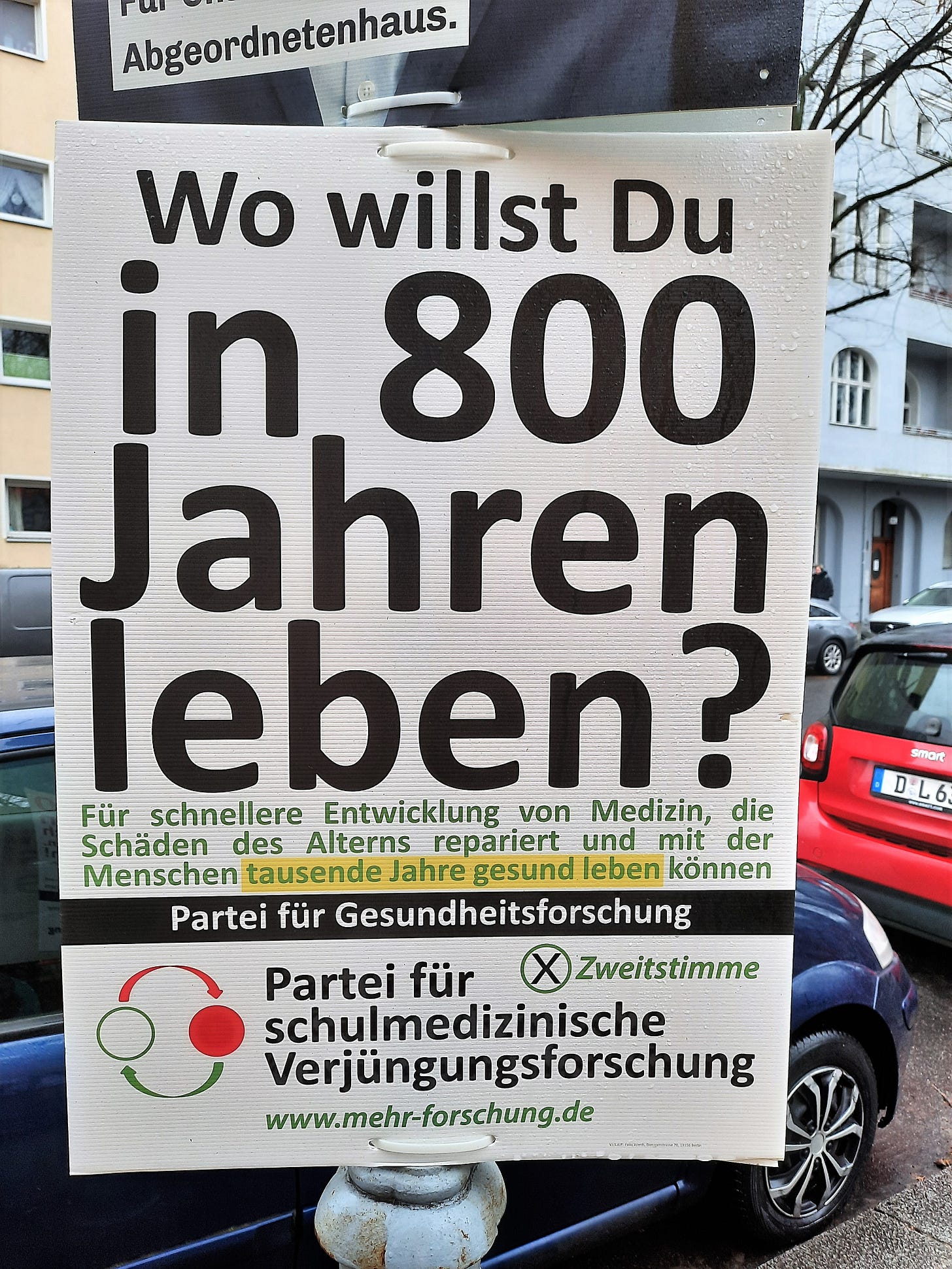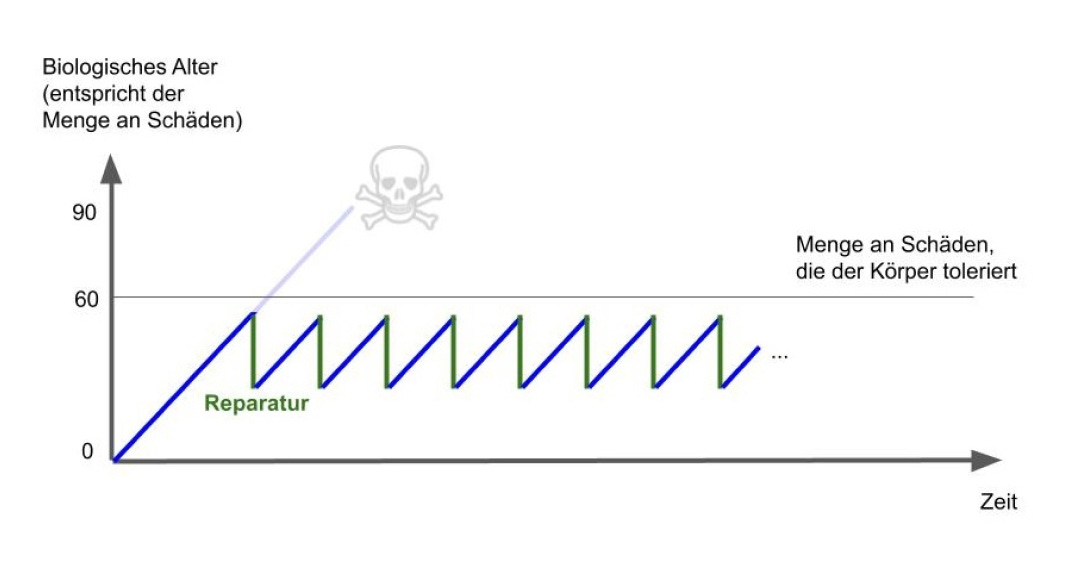The biggest deflationary shock of all times ..
.. is about to happen in our lifetime
Maybe you are one of about 80 millions voters who had to vote during the elections of the European Parlament in 2024. Maybe, deliberately or not, you saw one of the voting advertisements shown in the image below.
It is an advertisement for the so-called “Partei für schulmedizinische Verjügungsforschung”. Briefly speaking, it’s a party that has its sole focus on finding a scientifically proven way of rejuvenating people. What might seem like a political joke is actually creating public awareness for what is likely to happen within our lifetime: Extending not only our lifespans but also our health spans far beyond what we are currently used to.
If you visit the party’s website, they have a qualitative graph, how this is imagined:
The basic idea is that technology will allow us to repair “biological damages” faster than we can accumulate them. In the upper plot the repair process is depicted as “almost instantly” which is one of humanities wildest dreams as it was imagined in countless traditions, myths and tales. This would give us an infinite lifespan as well as a perfect healthspan.
While this will not be possible in the nearest future, it is not necessary in the beginning to rejuvenate over night in order to escape death by accumulation of biological damages. It is sufficient to reach the point of so-called “longlivity escape velocity”. This point marks the time when advances in biotechnology are moving faster than the natural cycle of biological decay: After living 5 years, there is tech available that allows you to live 6 years, and after 6 years, there is tech available, that allows you to live 8 years, and so on. Thus, after some time indeed a state as depicted in the graph above is reached.
However, the purpose of this text is not to go into detail what different technologies are under way to help us get there and how long it is going to take us but rather on some interesting implications once we reached this point.
As of today, time, especially with good health, is considered the most valuable thing that we can have – the thing that money can’t buy in the end. What does it mean then, that we can extend our healthspans to practical infinity? I think of it as the biggest deflationary act of all times - the greatest 0 to 1 step imaginable.
Maybe you remember how salt was a very valuable good and now can be shopped for practically nothing in every grocery store around the corner. The same is true for all kind of spices, or all sorts of teas, or the supply with fresh, drinkable water, or light at night time, or energy .. and the list could go on for long. All those things that were of immense value due to its scarcity; but only until the point in time when advancements in governance and technology allowed large scale production and proliferation of this good.
We might ask ourselves what might follow next in the list? Some people argue that oil might lose a lot of its value once the transportation sector is largely electrified (and the electricity is supplied from fusion/fission and renewables), another thing on the list might be of intellectual property (IP) as it can be created easier and aiser by advancements in AI.
But I think few things are more exciting than to think that our most fundamental and most limiting resource – our precious time – will go from a maximum, fixed amount to practically unlimited. I cannot imagine a bigger deflationary thing that could occur.
On top of having “unlimited time” in absolute terms, I could also foresee that the “relative value” of time might decrease due to several effects:
1) Right now we live in a time of exponential advancement which means the earlier you jump onto the right thing, the more value it has. One can imagine, that in a time not too distance from now we will reach a plateau where advancement will plateau (at least from a human perspective) and thus, the rush and necessity to get things done as quickly as possible and be “the first” will be converging towards zero.
2) While the necessity to do things quickly will reduce, the ability to do and learn things quickly will greatly improve: On the one hand side, by maintaining for a life-time the health of a young body and the plasticity of a young mind, allows for faster regeneration and more efficient learning. Also the process of learning will become more efficient by better sleep and all kinds of optimized learning techniques. As a consequence, mastering skills might go down to an average of 2000 hours of practice instead of 10 000 hours as today. On the other hand side, our unit productivity will increase by the revolution that is underway in AI and robotics.
Further, I think that the social implications for this are very hard to foresee. The first questions that come to the mind are “Will we overpopulate the planet even faster?” and “Will we have to define a maximum life-span by law because the biological definition is outdated?” followed by “If such laws are in place will a new privileged class emerge that can circumvent these laws?” etc.
Regarding the first question: As we have seen for many years now – the better the living standards of people are, the less kids they tend to have, and later in life. I would assume that if the “biological clock” is made stop to tick by an infinite healthspan, this trend will be put on steroids and people will get kids much later during their lives, thus to some extent balancing out the longer lifetimes of people. Ideally, the balance can be maintained for as long as need to reach “planet escape velocity”, i.e. we can go to and live on new planets faster than the previous ones get overpopulated.
The second question will probably depend on what is written in the previous paragraph: Will we reach “planet escape velocity” fast enough to evade such measures?
Regarding privileged classes: I think that the danger is greater that classes that are privileged today will try to maintain their privileges and extent them by trying to withhold the necessary technology for rejuvenation from wide public proliferation, rather than a new privileged class to emerge. However, almost any technology found its ways into common households, thus making me optimistic about widespread access to healthspan extending measures once they are available.
One thing that is important to mention here is that the value of time should not be confused with the value of life. Having the ability to repair biological damages doesn’t mean that death cannot occur by any other means, i.e. through accidents, acts of violence or diseases which it might still take a while to find the right cure. for “Immortal” does not mean “invulnerable” and that is important to remember.
The value of life might become even greater as a lost life is not a century of years lost but many centuries if not millennia.



